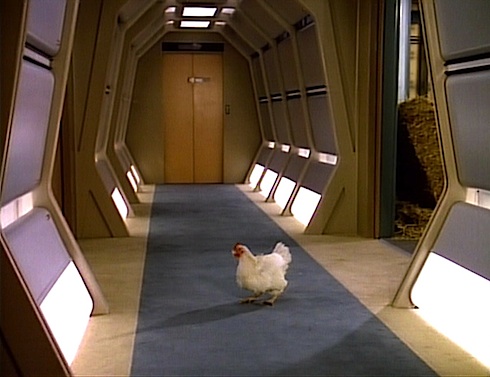“Up the Long Ladder”
Written by Melinda M. Snodgrass
Directed by Winrich Kolbe
Season 2, Episode 18
Production episode 40272-144
Original air date: May 22, 1989
Stardate: 42823.2
Captain’s Log: The Enterprise is given custody of a distress call that a starbase picked up. It took the starbase hours to figure out that it is a centuries-old S.O.S. that was in use by the European Hegemony in the twenty-second century. But there’s no record of an Earth ship in the Ficus Sector, where the signal’s coming from. The time frame was sufficiently chaotic, following World War III, that the lack of records isn’t surprising, but Data suggests looking for a manifest, which turns up the S.S. Mariposa, which fits the bill. Said manifest includes some incredibly sophisticated technology for the time, as well as a great deal of farming equipment and livestock.
The ship traces the signal to a system with a habitable planet, but which also has nasty solar flare activity—which explains the distress call. There are about two hundred colonists—as well as a considerable number of animals. These are the Bringloidi, who have no technology beyond the radio they used to send the S.O.S., but live an entirely rustic existence that was considered a throwback in their own time (and in ours).
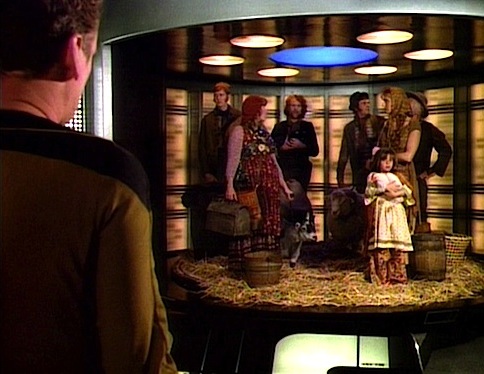
As they settle in, the colony leader, Danilo Odell, asks Picard if they ever in their travels heard from the other colony.
Assuming that that was where all the high tech stuff went, they find another Class-M planet only half a light-year from the Bringloidi colony, only to discover a colony of humans. They had thought Earth had suffered some catastrophe when nobody checked on them, when the simple truth was that they were lost in the bureaucracy.
It turns out their arrival was fortuitous. The S.S. Mariposa was damaged upon arrival, and only five people survived. Three men and two women weren’t enough to form a viable gene pool, so they turned to cloning. Unfortunately, after three hundred years, the clones are suffering from replicative fading—subtle errors that creep in when you’re making a copy of a copy. Apparently clones are analog and not digital.
The crew refuse to offer tissue samples so that the Mariposans can create new clones. Riker is particularly effusive on the subject of his refusal. The Mariposans try to steal tissue samples from Enterprise crew, but that is discovered and stopped immediately.
Pulaski points out that even if they did clone Enterprise personnel, it would just delay the inevitable. What they need, she says, is breeding stock.
Everyone stops dead: “The Bringloidi,” Picard says, and suddenly they have a solution both to the Mariposan problem and to getting all this stuff off the ship.
Can’t We Just Reverse the Polarity?: Apparently, the cells lining the walls of the stomach are the best ones to use for cloning. For those of you planning to raise a clone army out of your basement lab.
Thank You, Counselor Obvious: Troi tells Picard that Prime Minister Granger of Mariposa is hiding something. But she can’t say what, so her advice really just serves to create artificial suspense.
There is No Honor in Being Pummeled: Worf suffers from Rop’ngor, a childhood ailment. In exchange for Pulaski keeping the specifics of this rather embarrassing illness a secret, Worf performs a Klingon tea ceremony for her—though it requires her to take an antidote, as the tea is poisonous to humans.
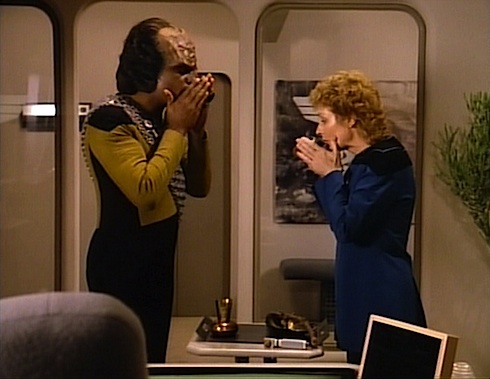
Later, Worf gets to intimidate Odell (“I can’t imagine security is much of a problem for you”), provide Odell with booze (“If you wish, it can be real alcohol, with all the deleterious effects intact”), and fail to intimidate Brenna (“She is very much like a Klingon woman”).
If I Only Had a Brain…: Data is the one who thinks of checking the manifest, and who also cites a contemporary “back to nature” movement led by someone named Liam Deegan that was likely the inspiration for the Bringloidi’s way of life. He also tells Picard, rather uselessly, that mariposa means “butterfly.”
No Sex, Please, We’re Starfleet: Worf tells Pulaski that it is among the Klingons that love poetry achieves its finest flower during the tea ceremony, prompting her to ask him to quote some of it.
Riker and Brenna totally hit all over each other and are knocking boots within an hour of meeting each other. (Or, rather, “washing feet,” which seems to be the euphemism among the Bringloidi.)
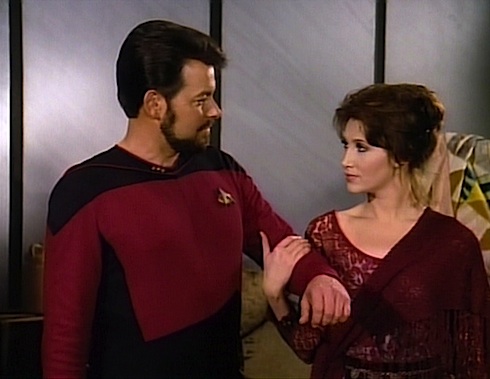
Both members of the Odell family salivate at the idea of having multiple partners in order to re-seed the Mairposans.
I’m a Doctor, Not an Escalator: Busy week for Pulaski. She gets to hide Worf’s embarrassing illness, have a Klingon tea ceremony, suggests sending the Bringloidi kids to the ship’s school, surreptitiously examines the Mariposans to discover they’re clones (which is probably unethical), and helps Picard broker the deal between the Bringloidi and Mariposans.
Welcome Aboard: Rosalyn Landor and Barrie Ingham are walking, talking clichés as the Odells, but they’re actually very entertaining with superb comic timing, for all that their characters grate. Jon de Vries is mostly awful as the various Grangers.
I Believe I Said That: “What the hell was that thing?”
“Automated fire system. A forcefield contains the flame until the remaining oxygen has been consumed.”
“Ah, yeah. What—what if I’d been under that thing?”
“You would have been standing in the fire.”
“Yeah, well, leaving that aside for the moment, what would have happened to me?”
“You would have suffocated and died.”
“Sweet mercy…”
Odell asking about the shipboard fire-suppression systems, and Worf answering.
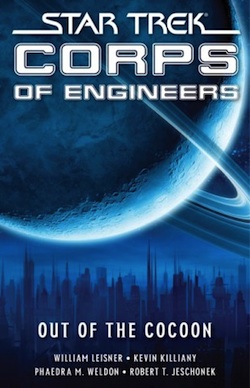
Trivial Matters: This episode would be followed up on in the Star Trek: Starfleet Corps of Engineers eBook Out of the Cocoon by William Leisner (reprinted in the eponymous trade paperback), where the U.S.S. da Vinci goes to Mariposa eleven years later to find that the melding of two cultures hasn’t gone as smoothly as Picard had hoped.
The episode was initially titled “Send in the Clones,” which would’ve been a much better title. The line is used by Odell in the episode.
Writer Snodgrass’s original notion was to do an immigration riff, and it was co-executive producer Maurice Hurley—an Irish-American who leads the St. Patrick Day Parade—who suggested they be agrarian Irish people.
The Mariposa launched during the rough timeframe that Star Trek: Enterprise would take place in, which was established as a period of intense colonization.
Make it So: “I must be out of my mind.” It’s remarkable that an episode with this pedigree—the writer responsible for “The Measure of a Man,” the best director in the TNG slate of regulars, not to mention a guest star of Barrie Ingham‘s calibre—is such a total misfire. The episode has two major shifts in tone, from the artificial suspense of Worf fainting on the bridge, which turns out to be utterly meaningless, switching to the low comedy of the Bringloidi, switching to the cheap drama of the Mariposans, and none of it works particularly well.
The Bringloidi are the worst Irish stereotypes, and the Mariposans are even worse—they’re boring.
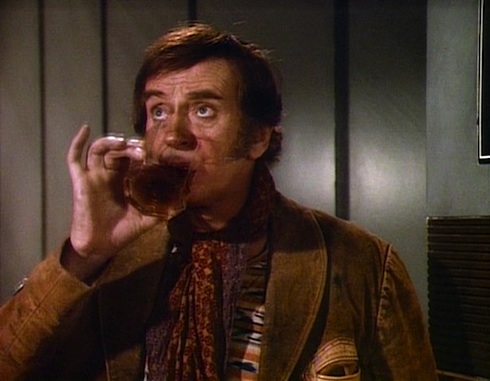
Having said all that, I will give the episode this—it’s funny. The gags are cheap, yes, but you watch this episode and you laugh. Not only the lines I quotes above, but so many others (“I have a daughter.” “Felicitations.”) are just out-and-out funny.
But the laughter does catch in your throat when you realize just how dumb it is.
Warp factor rating: 4
Keith R.A. DeCandido has short stories out in the anthologies Liar Liar, More Tales of Zorro, and Tales from the House Band. His most recent novels are Guilt in Innocence, part of “Tales from the Scattered Earth,” a shared-world science fiction concept, and the fantastical police procedurals SCPD: The Case of the Claw and Unicorn Precinct. Find out more about Keith at his web site, which is a portal to (among many other things) his Facebook page, his Twitter feed, his blog, and his podcasts, Dead Kitchen Radio, The Chronic Rift, and the Parsec Award-winning HG World.










